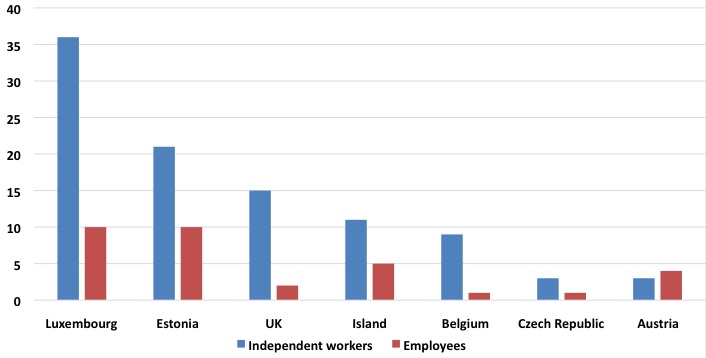Management is a tricky, pervasive word today. Everybody manages something: a budget, a house, a family, a team, a car… Beyond the omnipresence of management as a discourse and buzzwords, what is less obvious is the growing transformative effect of management (as a practice) on our everyday lives. Management transforms deep dimensions of our sense of togetherness and even, political life. The way we move inside and outside the city, the way we express (or not) ourselves in the context of public debates, modes of legitimacy and representativeness, are deeply changed, in particular by contemporary entrepreneurs and their disruptive business models. Their models are not only disruptive for their industry. There are also (and more and more) transformative for democracy, public infrastructure and public life at large.
The political effects of management are not new. In the 20s and 30s, Henry Ford, with his T model, also changed American society, its social compromise and way of life (e.g. favouring mass consumption and new mobilities inside and outside the city). But since the 90s, the political effects of management have taken on an extent (potentially global), a depth (they can touch the very mechanism of democracy and democratic forums) and an unpredictability (global economic actors sometimes emerge within less than one year) which are radically new.
Digital companies such as Google, Facebook and Amazon have deeply changed the way we consume, and most of all, make sense of our world. Our communication and sense of togetherness have been dramatically modified by their business models. Most of all, they have deeply transformed the public infrastructures we usually draw on to meet, move, connect, legitimate and protest. Such is also the case today with more physical infrastructures such as coworking or maker spaces. These infrastructures used to be the preserve of public policies which appear today more and more managerialised in their discourse and less and less transformative for public life.
How did we arrive at this state of affairs? In the continuation of a recent White Paper (RGCS) I have coordinated[1], I see three superimposed trends favouring this new context: more and more liquid (entrepreneurial) societies, greater potential connectivity and new political consciousness of managers and citizens.
- More Liquid Societies Focused on Managerial Activities and Entrepreneurial Projects
The number of independent workers is exploding (in 2020, there are predicted to be more independent workers in the US than waged employees in the US, see MBO study of 2014[2]). As a trend, divergent evolution of waged employment and entrepreneurship and all kinds of independent activities are largely in favor of independent work (see figure below).

- Figure 1: Number of independent and waged employees, from the second trimester 2010 to the second trimester 2014 (in percentage). Source: Eurostat Labor Market.
It seems that individuals are moving – or returning – to a more simple work force (intellectual or physical) that vast numerical, legal and capitalistic assemblers will assemble and de-assemble, depending on the needs of products and financial markets. All this is done of course far beyond usual frontiers and boundaries of collective activity (‘firms’ and ‘organizations’), the States involved and the legislation applying to it.
Organizations in the classic (structural) sense disappear, both temporally (the boundaries between work and home, or consumers and producers collapse, as well as the specific practices corresponding to them) and spatially (with the development of mobile technologies, teleworkers, digital nomads, the generalization of virtual and distributed modes of collective activities).
- Greater Connectivity of Managerial Practices
The connectivity of apparently fragmented activities keep increasing. The infrastructure of the Internet at large, the network technologies around it (e.g. Wi-Fi) or the new informational platforms inside it (e.g. Google) make it possible to draw on amazing resources and to connect globally without accumulating the amazing capital which would have been necessary 40 years ago to do it. New collaborative spaces in particular (e.g. coworking spaces) but also the new transport infrastructures make it possible to connect and reconnect to a community of employees and/or customers very easily. This trend towards opening management and organizations dramatically changes managerial practices and the usual perimeter of its effect which become potentially more global, more public, more tightly bounded into everyday activities of the employee and customers involved in it.
The processes of sensemaking we are involved in have dramatically changed since the late 90s. More and more, we outsource information and cognitive routines. The digital world is much more than a big set of tools and data. It is also a set of routines. We do not remember precisely an information, but the way to find it (e.g. the keywords we typed) on Google. Most of all, part of our routines of socialization are also changed virtually by these tools. Even when they do not use Facebook, teenagers develop friendships in a Facebook like manner and in the context of parties, think about the fact that pictures can ‘potentially’ be taken during the event and be put online on Facebook, What’sapp or Snapshat. Information flows globally, beyond any private or public distinctions, and is likely to be very quickly part of public or political debates. In this context, again, managerial agency is likely to blur the line and enter into public and political debates, linking the ‘acting together’ with the ‘living together’.
- New Political Consciousness: Collaborative Movements and the Corporate World
Lastly, the third trend is about an increasing political reflexivity, well beyond usual political categories such as class or professions. This has already started a long time ago with the emergence of business ethics, corporate responsibility and sustainable development. Since the 20s, managers have become aware of the potential social and environmental consequences of their practices. But more recently (in the 2000s), with the emergence of numerous collaborative movements, political reflexivity in innovation, HR and financial processes is higher than ever. Beyond traditional organizational members (or people defining themselves as organizational members), managers question their practices in contexts which go far beyond usual boundaries of organization, and relate to communities and social movements. The surprising side-effects of collaborative movements for companies drawing on hackathons, coworking spaces, maker practices… is that these new muses are also likely to bring political reflexivity as they are deeply political projects (emphasizing for instance, and paradoxically in the context of the corporation, the importance of open knowledge).
Class and access or not to private properties do not seem to be a boundary, in particular with the emergence of the so-called “sharing economy” (which seems to be very compatible with the capitalist system). And the political discourse is not the prerogative of politicians themselves or a political class, as it seems that more and more activities ‘hack’ political debates (see this picture below of Nuits debouts in France)[3]. How about going one step further? How about producing reflexively more transformative effects with management? Collaborative communities inside the city could be, for some of them, new agora. Places in which managers could discuss and debate the political effects of their activities in front of those who will be transformed by them. For sure, academics could and should be in the loop as well. Should such a scenario occur, I would love to be one them.

- A general assembly of Nuits debouts in Paris (April, 2016, source: Le Monde)
FdV
[1] https://collaborativespacesstudy.files.wordpress.com/2016/04/livre-blanc-rgcs_version-alpha-bis.pdf [in French, English-speaking version will be published very soon]
[2] http://www.union-auto-entrepreneurs.com/wp-content/uploads/2016/01/2014-MBO_Partners_State_of_Independence_Report.pdf This strong statement and the general move towards a self-employed society has been the subject of numerous discussions (see e.g. this great critical HBR post by Justin Fox https://hbr.org/2014/02/where-are-all-the-self-employed-workers/). What remains is a clear increase of self-employment in most western countries, with a stronger increase for some categories (i.e. artists, creative works, communication, IT and digital jobs).
[3] See also the very interesting case of Audrey Tang in Taiwan http://www.booksandideas.net/Civic-Hacking-and-our-Political-Future.html .
